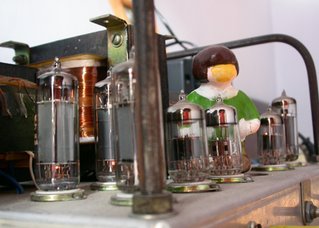


|

|
|
|
Home |
The Mil & Aero Blog
 Posted by John Keller For a long time now, analog electronic architectures have been considered black magic among mainstream systems designers. Analog is difficult to design, simulate, and implement, and has been the realm of a small cadre of lunatic-fringe mad scientists for whom analog has been a career focus. That may not be the case much longer, however, due largely to work at the Georgia Institute of Technology in Atlanta, according to a story by Sunny Bains in EE Times entitled Analog's answer to FPGA opens field to masses. Georgia Tech scientists have come up with field-programmable analog arrays, otherwise known as FPAAs, which have the potential to make analog design far more accessible to mainstream engineering than it is today to tackle sophisticated and low-power solutions to problems like converting analog information to digital data. As it is, only about 3,000 analog engineers in the world are practicing their craft today, according to the EE Times article. Exploring power-efficient analog solutions could be particularly beneficial for military and aerospace electronics engineers who must deal with applications like radar, electronic warfare, and signals intelligence that must convert massive amounts of analog information to digital data before passing it along to sophisticated digital processors. Writes EE Times: If FPAAs encouraged even a small proportion of those engineers to start using analog technology, it would make a huge difference. "The aim is to feed these approaches into mainstream engineering," Hasler said. "That process is starting by providing a strong educational infrastructure, which is already happening at the grass-roots level." Just like field programmable gate arrays (FPGAs) have created a revolution in digital signal processing, perhaps a new generation of FPAA technology may be the next fundamental advancement in electronic design. One big advantage of FPAAs could be an increase in processing speed because analog computations often have much better scaling between resolution and computation time. With analog, each additional "bit" does not require its own operations, writes EE Times. It seems that the electronics and computing industries have been waiting for quite a while for the next major technological revolution. Leading-edge microprocessors and FPGAs certainly have been advancing, yet their progress has largely been incremental. It will be interesting to see what the next generation of analog circuitry might bring. 0 Comments:
<< Home |
Welcome to the lighter side of Military & Aerospace Electronics. This is where our staff recount tales of the strange, the weird, and the otherwise offbeat. We could put news here, but we have the rest of our Website for that. Enjoy our scribblings, and feel free to add your own opinions. You might also get to know us in the process. Proceed at your own risk. 
John Keller is editor-in-chief of Military & Aerospace Electronics magazine, which provides extensive coverage and analysis of enabling electronic and optoelectronic technologies in military, space, and commercial aviation applications. A member of the Military & Aerospace Electronics staff since the magazine's founding in 1989, Mr. Keller took over as chief editor in 1995.  Courtney E. Howard is senior editor of Military & Aerospace Electronics magazine. She is responsible for writing news stories and feature articles for the print publication, as well as composing daily news for the magazine's Website and assembling the weekly electronic newsletter. Her features have appeared in such high-tech trade publications as Military & Aerospace Electronics, Computer Graphics World, Electronic Publishing, Small Times, and The Audio Amateur.
Courtney E. Howard is senior editor of Military & Aerospace Electronics magazine. She is responsible for writing news stories and feature articles for the print publication, as well as composing daily news for the magazine's Website and assembling the weekly electronic newsletter. Her features have appeared in such high-tech trade publications as Military & Aerospace Electronics, Computer Graphics World, Electronic Publishing, Small Times, and The Audio Amateur.
 John McHale is executive editor of Military & Aerospace Electronics magazine, where he has been covering the defense Industry for more than dozen years. During that time he also led PennWell's launches of magazines and shows on homeland security and a defense publication and website in Europe. Mr. McHale has served as chairman of the Military & Aerospace Electronics Forum and its Advisory Council since 2004. He lives in Boston with his golf clubs.
John McHale is executive editor of Military & Aerospace Electronics magazine, where he has been covering the defense Industry for more than dozen years. During that time he also led PennWell's launches of magazines and shows on homeland security and a defense publication and website in Europe. Mr. McHale has served as chairman of the Military & Aerospace Electronics Forum and its Advisory Council since 2004. He lives in Boston with his golf clubs.
Previous Posts
Archives
|
|||||
Internet gems
THE MAE WEBSITE AUTHORS ARE SOLELY RESPONSIBLE FOR THE CONTENT AND ACCURACY OF THEIR BLOGS, INCLUDING ANY OPINIONS THEY EXPRESS, AND PENNWELL IS NOT RESPONSIBLE FOR AND HEREBY DISCLAIMS ANY AND ALL LIABILITY FOR THE CONTENT, ITS ACCURACY, AND OPINIONS THAT MAY BE CONTAINED HEREIN. THE CONTENT ON THE MAE WEBSITE MAY BE DATED AND PENNWELL IS UNDER NO OBLIGATION TO PROVIDE UPDATES TO THE INFORMATION INCLUDED HEREIN.
|
||||||
|
|
Home | About Us | Contact Us | Corporate Website | Privacy Policy | Courage and Valor Foundation | Site Map
Also Visit: Laser Focus World | Vision Systems Design | Industrial Laser Solutions Copyright © 2007: PennWell Corporation, Tulsa, OK; All Rights Reserved. | Terms & Conditions | Webmaster |